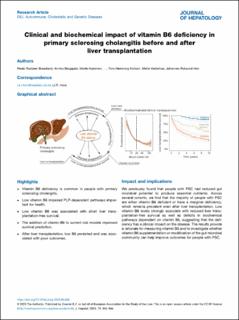Clinical and biochemical impact of vitamin B6 deficiency in primary sclerosing cholangitis before and after liver transplantation
Braadland, Peder Rustøen; Bergquist, Annika; Kummen, Martin; Bossen, Lars; Engesæter, Lise Katrine; Reims, Henrik Mikael; Bjørk, Ida Torunn; Grzyb, Krzysztof; Abildgaard, Andreas; Småstuen, Milada Cvancarova; Folseraas, Trine; Trøseid, Marius; Ulvik, Arve; Ueland, Per Magne; Melum, Espen; Line, Pål Dag; Høivik, Marte Lie; Grønbæk, Henning; Karlsen, Tom Hemming; Vesterhus, Mette Nåmdal; Hov, Johannes Espolin Roksund
Peer reviewed, Journal article
Published version
Permanent lenke
https://hdl.handle.net/11250/3091656Utgivelsesdato
2023Metadata
Vis full innførselSamlinger
Sammendrag
Background and aims: We previously demonstrated that people with primary sclerosing cholangitis (PSC) had reduced gut
microbial capacity to produce active vitamin B6 (pyridoxal 5’-phosphate [PLP]), which corresponded to lower circulating PLP
levels and poor outcomes. Here, we define the extent and biochemical and clinical impact of vitamin B6 deficiency in people with
PSC from several centers before and after liver transplantation (LT).
Methods: We used targeted liquid chromatography-tandem mass spectrometry to measure B6 vitamers and B6-related metabolic
changes in blood from geographically distinct cross-sectional cohorts totaling 373 people with PSC and 100 healthy controls to
expand on our earlier findings. Furthermore, we included a longitudinal PSC cohort (n = 158) sampled prior to and serially after LT, and
cohorts of people with inflammatory bowel disease (IBD) without PSC (n = 51) or with primary biliary cholangitis (PBC) (n = 100), as
disease controls. We used Cox regression to measure the added value of PLP to predict outcomes before and after LT.
Results: In different cohorts, 17-38% of people with PSC had PLP levels below the biochemical definition of a vitamin B6
deficiency. The deficiency was more pronounced in PSC than in IBD without PSC and PBC. Reduced PLP was associated with
dysregulation of PLP-dependent pathways. The low B6 status largely persisted after LT. Low PLP independently predicted
reduced LT-free survival in both non-transplanted people with PSC and in transplant recipients with recurrent disease.
Conclusions: Low vitamin B6 status with associated metabolic dysregulation is a persistent feature of PSC. PLP was a strong
prognostic biomarker for LT-free survival both in PSC and recurrent disease. Our findings suggest that vitamin B6 deficiency
modifies the disease and provides a rationale for assessing B6 status and testing supplementation.

